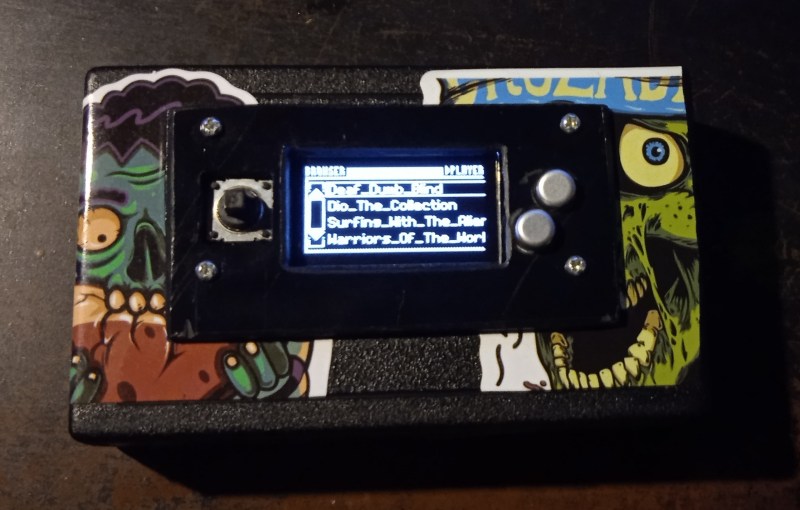There was a brief time in the early 2000s when we carried cellphones, wallets, keys, and a bespoke digital media player loaded with a small selection of our music libraries. Devices like iPods, Zunes, Sandisk Sansa, and iRiver. Then as cell phones gained more storage and processing power, the two devices became one, and audio players slipped to obscurity as sports accessories. Perhaps in that vein, [BalderDragonSlayer] made his own Raspberry Pi-powered media player.
The device was cobbled together using a Raspberry Pi Zero, an Adafruit OLED bonnet, a LiPo charger, and a cheap USB DAC. The interface software is written in python, which has all your usual player controls, using the directional joystick and two pushbuttons on the bonnet. DietPi is a slimmed-down Linux that offers an impressively fast boot time, which is why it was picked for this project. The case was a simple project case with some holes dremeled into the face for the screen and buttons.
It is a wonderful little project that seems wonderful for walks in the park. This isn’t the first Pi-powered media player we’ve seen before. But we’re hoping we see more in the future.
















Zunes ? nay… did someone buy one of those ? I remember reading “The inquirer” at the time, they were very acid with their comments, and on one comment someone wrote “I’ll put this tune in my zune” I think that was the most brillant comment I ever read about it. “Plays for sure” yeah sure.
It did… just for small values of ‘for sure.’
portable? with power? how long this player work? week?
Bless your heart for including iRiver. As a young rebellious teen, I chose a 256mb iRiver mp3 player to be my only Christmas gift. Ran off a single AA, which made up 90% of the body. Rugged AF. Lasted over 10 years till I lost it=( I was easily able to record the school finals study guides on the device. Its folder system aloud easy organization of subject, chapter, and question. I would wear a hoodie with a hole in the pocket and a small slit in the cuff. Player in pocket, single speaker ran through the inside through the sleeve and tucked into the cuff. With the elbow on the desk, I would rest my head on my hand, perfectly lining up the speaker to me ear. Pulled a lot of grades up that way.
This concept probably needs some love like it’s never needed love before. Is it back for more though after Fiio with their M5, Shanling with their M0 and Hidizs with their AP80 Pro? Neat idea. Hoping we see more of something similar but actually open source too. Do like the RPi side of things being used here though. Are there other DAPs (digital audio players since MP3 players seems to be archaic now) out there that are similar in size and commercially available and open source or even closed source but likely written with open source code?
Pi Zero? No wonder he needs a 15 watt-hour battery. Yeesh. And he’s still only going to get less than 10 hours out of it.
“because I can” is a perfectly valid excuse to build something like this, but: When your choice of modern hardware can’t come within a factor of 10 of the performance of a generic 25-year-old music player in power consumption, weight, or size, you should wonder why you bothered.
I was wondering that. Probably a pi pico could do this, when combined with a dedicated MP3 decoder chip.
If you use a dedicated decoder chip, a slow avr can do it. Source: did it myself 5ish years ago.
Now that the mp3 codec doesn’t need a license anymore, there also open source libraries that can do it on processors with enough throughput. I’ve heard the esp8266 can do it well, and the pico has a somewhat comparable clock, so you could likely do it on a pico without a separate decoder chip.
The pico has access to a dedicated i2s DAC hat as well, with line level and headphone amped output. Just gotta teach it how to read, it already knows how to sing.
I’m planning to build mine around a Zero for two simple reasons: I want FLAC and Bluetooth support. The market for such a device is very underserved for those that want tactile buttons for all the features without a touchscreen, so I’ll just have to build my own. And at least I get to choose what firmware it’s running, because I’ll have to build that myself.
This actually sounds like a cool project. Then again, I still use a Motorola V60S so anything that stores and plays music is kind of cool. Where did I leave my walkman?
Chosing Raspberry Pi for portable batterry-powered device doesn’t sound like the optimal solution. Early prototype or proof-of-concept – yes but not something for normal use
Unless you need the higher performance or extra wireless peripherals for some more demanding formats or use cases.
is it doable with the raspberry pi pico?